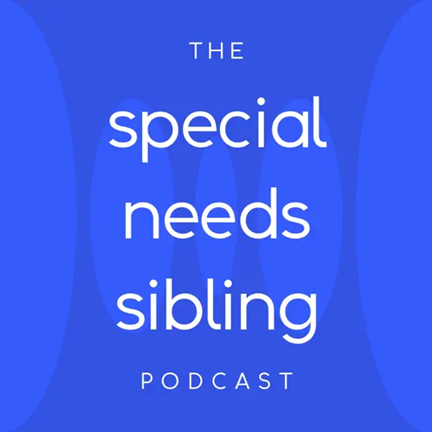The Special Needs Sibling Podcast (2023 – current)
“A space where we talk about what life is REALLY like as a sibling to someone with a mental and/or physical disability.”
Listen on your favourite platform
“The series as a whole is presented by someone who is an adult sib herself – Charlene, who is in America (I mention this because it has an American flavour in places and references to how certain things work in the US rather than UK). She grew up with a sister with autism who was 2 years younger than her, and she started this podcast to shine a light on sibling type issues. The style of the podcast is that there is a guest in each episode who is a sib too. Each episodes provides the audience with a nice friendly and honest chat about a variety of topics. There is an intro at episode 1 – if you want to get more of an idea about the podcast that gives an overview. But some of the principles are about: helping to normalise the feelings/experiences a sib might have, helping sibs not to feel alone, and putting us at the centre of attention in a way that typically didn’t happen for us as kids.”
Review by adult sibling Julia
Reviews: Episode 2, Oldest Siblings Unite!
Charlene talks to Anastasia, an oldest sibling like herself, and they discuss the highs and lows of their experiences in a cheery, witty hour of chat. Most siblings will identify with the sense of recognition you get when you speak to another sib, and this is a pleasurable eavesdrop on one of those conversations we have likely all had. Both Charlene and her guest have a younger sibling with autism, but whether your brother or sister has autism or another difficulty, there is much here in their discussion that will resonate with you – and whilst they do focus at times on the experiences specific to oldest siblings, so much of what they discuss will feel relevant, whatever your place in the birth order. Topics range from wishing you could swap lives with your brother or sister, to how habits and thought processes formed in childhood spill over into adult life – for better or worse. They also explore the ambivalent feelings we may have towards our parents, our non-disabled siblings and others. As regards being the oldest, Charlene and Anastasia carefully unpick the nuances of feeling doubly responsible for their brother or sister, and how this can result in being a ‘pseudo-parent’. Although officially episode two, this is in reality the first full-length episode after a short introduction to the series and a great place to start.
Review by adult sibling Alex
As the oldest sibling myself (there’s just the two of us!), I felt like my feelings were being echoed through the podcasters when listening to this episode- like someone FINALLY understood how I felt. Not just as my sib’s sibling, but about how I feel as the oldest and how the unseen (and seen) responsibilities of that role shaped the person I am. There were some moments where I laughed at their stories – finding humour in the common experiences I shared with them. There were times when I nodded along and felt like I was part of their conversation. And finally, there were times where I almost cried, because I didn’t feel alone anymore.
I would recommend this episode to any sibling of someone with special needs- especially the eldest. It will make them feel validated, strong, and most importantly, let them know about the community of us out there as sibs and that they’re not alone. Whether that is through the Sibs charity or through this podcast, they will always be welcome in this community.
Review by adult sibling Zoe
Review: Episode 16, I Am More Than Just “A Good Sister”
In this episode, Charlene speaks to Emma, who, like her, has a sibling with autism. Once again, it’s a chance to listen in on one of those conversations we have hopefully all had with other siblings, where shared feelings and experiences are recognised, and it makes little difference whether your brother or sister has autism or a different difficulty, as you will likely recognise some of the feelings and experiences too. With the warmth and good humour we are used to from on this podcast, Emma and Charlene discuss the thought patterns siblings adopt in terms of always thinking ahead and taking responsibility for their brother or sister – regardless of whether their parents or anyone else ever asked them to do this. They also share their internalised pressure to be ‘perfect’ – to be a high achiever at school, to behave well – but also the darker side of trying to be ‘good’: not expressing anger or sadness due to a perception that nobody in the family has the capacity to meet your needs when your sibling’s needs overwhelm everybody already. The statement “family was not the space where I was going to get my emotional needs met” sounds tragic on its own, but, as with so many disturbing aspects of sibling life, when said to another sibling there is a laugh of recognition as it’s something so many of us are so used to. As an American podcast, Charlene and her guests speak casually about therapy, but in this episode its importance is highlighted as Emma recounts how relentless internal pressure to be ‘good’ became unsustainable and she needed professional help.
Review by adult sibling Alex
Review: Episodes 22A & 22B, From Sibling to Primary Caregiver
Susan’s story told across these two episodes is a heart-warming and positive listen to someone who has devoted her adult life to the care of her oldest sibling. Having lost both parents, she took on the primary care-giving role to her oldest sibling to avoid sending him to live in a care facility. She discusses the pros and cons of the decision she made to have him live with her, using a series of stories about her life with her brother before and after their parents’ passing. Susan speaks with clarity and passion about the difficulties of claiming benefits, of the impact on her life, right down to her career choices, and the complications of finding the right caregivers to help her so that she can continue to work. Susan advises that it is not wrong to decide to find a care facility for your sibling, which will allow you to have some freedom in your own life, while your sibling may benefit from living in an environment with specialist care. She also talks about managing your expectations if your sibling has a degenerative condition – as their needs change, or their abilities lessen, how your relationship with them will alter. Something which I feel many siblings will be able to relate to, is how she speaks about the sadness of her ‘fun’ sibling relationship which diminishes as her caregiving ‘parental’ relationship increases. Some of the conversations relate specifically to how things operate in America but the general difficulty in navigating the intricate nature of being a sibling carer will resonate with people across the world.
Review by adult sibling Fiona
Review: Episode 32, Identity & the Fast-Approaching Realities of Caregiving
Host Charlene talks to sibling Amanda whose experiences have led her to start a non-profit organization that advocates for 400 families.
Their conversation covers sibling isolation and the difficulties finding an identity while being unable to understand the situations surrounding your sibling due to emotional immaturity. It explores the difficulties of building friendships whilst navigating complex family dynamics. It moves on to discuss assumptions the public about siblings from day one such as you are ‘the good helpful one’ or so ‘patient’ to you as the sibling will be the caregiver when your parents pass.
The conversation will universally resonate with siblings but some of the examples are very specific to the US audience.
Review by adult sibling Jenny
Review: Episode 39, Sacrificing Yourself and Taking Up Space
Episode 39 is called ‘Sacrificing yourself and taking up space’, and sees Charlene meet guest Gina DeMillo Wagner, who is a sib who had an older brother with Prader Willi syndrome – so pretty complex needs including learning disability and violent outbursts. The first part of the episode covers Gina’s experiences of growing up, and navigating family relationships, including parents that divorced when she was young and later estrangement from her mother. Gina is a writer by profession and she discusses two major writing projects relating to her sib experiences that both sound interesting – firstly a piece in the New York Times (Mourning the Loss of a Sibling Rival – The New York Times) and secondly a memoir (Forces of Nature: A Memoir of Family, Loss, and Finding Home eBook : Wagner, Gina DeMillo: Amazon.co.uk: Kindle Store). (And if you want to know more before buying either of these, here is a (free) article that I liked with Gina talking about her writing, about complex families and about complicated grief: Gina DeMillo Wagner’s NYT essay revealed an underserved audience). The remainder of the podcast episode covers lots of meaty sib topics – e.g. not getting your needs met as a kid, layers of grief, lots of feelings/experiences being swept under the carpet as children that might re-emerge in adulthood and/or if we become parents, etc. Both Charlene and Gina have been to quite a lot of therapy as adults and they talk about how this has helped them – I loved this part of the conversation and for other sibs who have been to therapy it might feel really validating, or if you’re a sib considering going for some counselling/therapy then this might give you some helpful food for thought. Overall I enjoyed listening to the conversation which was refreshingly honest and covered a lot of different topic areas where I felt ‘oh yes I can relate to that’, even though my disabled sibling had a condition that is very different from either the host or guest.
Review by adult sibling Julia
Review: Episode 40, How Being a Sib Shapes Your Life
I have to admit, my heart sank when I realised this was an American based podcast. I assumed that the sibling experience would somehow be different, but I could not have been more wrong. The Special Needs Sibling Podcast is honest, raw and a worthy listen for anyone who is – or is close to – a sib.
Our host, Charlene, started the podcast in 2023 as ‘a space to help normalize the feelings, challenges, good times and bad times around being a sibling. A space where siblings can listen to other siblings and know that they’re not alone.’ In doing so, Charlene has created a powerful and insightful platform for the sib community.
In this episode, Charlene speaks to Suyapa about the experience of being the oldest child in an immigrant family. They reflect on the layers of responsibility that come with being the eldest child and the high expectations of being a good student whilst being a young caregiver, often without recognition or praise. They discuss how childhood experiences have shaped their adult lives and how the ‘sibling self’ drives everything from friendships to work to relationships.
The beauty about this podcast is the open discussion and the diverse perspectives. The conversation flows as Charlene and Suyapa share their feelings of growing up with a disabled sibling. Both speakers touch on their experience of people pleasing, the impact of resilience, their high tolerance for chaos and the importance of humour in dealing with situations.
Charlene and Suyapa’s honesty and humour makes this an engaging listen. It is heart-warming and comforting to hear others from across the pond talking about their feelings and experiences and despite my initial reservations, it is reassuring to know that the sib experience is universal and we are certainly not alone.
Review by adult sibling Suzanne
Autism: In conversation with auticon (2022)
Listen to Episode 9: Being a Sibling of an Autistic Person



“In the interests of transparency, I did raise an eyebrow at the beginning of this podcast when I discovered that one of the interviewees is the daughter of the presenter. I wondered whether that would lead to a conflict of interest which would mean perhaps a less open discussion, but in actual fact, I found it an insightful and honest hour of radio.
The three interviewees were from differing backgrounds (one with one older sibling only, one with both a neuro-typical sibling and an older sibling with autism, and one with three younger neuro-divergent siblings). Discussion ranged from the impact having a sibling with autism had on relationships with parents, to the kind of adult it had turned them into. It also covered how the interviewees came to realise that their upbringing was different – and how they learned that it’s alright to say that in fact it wasn’t always ok.
Inevitably, my own experience didn’t always align with those of the interviewees, but it did raise questions I hadn’t considered before. I also found that hearing insights from other siblings about their relationship with their neurodiverse brother or sister was very helpful in terms of creating a framework to start thinking about what is inevitably a deeply personal and complex subject for any sibling.
The Sibs charity got an extremely positive shout out – both for its current work and for how much the interviewees wished something similar had existed when they were struggling with the issues raised. All round, a highly recommended listen.”
Review by adult sibling Catherine
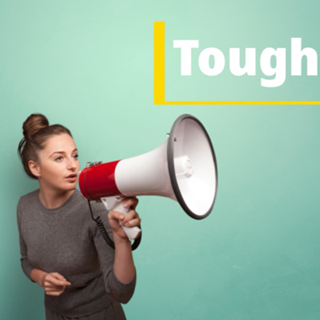
Tough topics in LD (2022)
Listen to S2, Episode 2: Thriving in times of challenge with Charlotte Flynn
“This podcast episode is a conversation between two adult siblings – Alistair, who is a physiotherapist specialised in working with those with disabilities; and his guest Charlotte who is a life coach who particularly likes to work with carers and siblings of disabled people. The first part of the podcast focuses on what life coaching is, how it can be useful, and how it differs from counselling (it’s future/solution focused and aids individuals to come up with their own solutions).
However, it was the second half I found much more interesting and engaging. In discussing some general tips Charlotte might have for siblings, Alistair and Charlotte end up having a really open conversation about their own experiences and there were a few things that really resonated with me and made me reflect on my own life and behaviours in a new way.
Whilst I initially thought during the first 5 minutes or so that the podcast was going to be a bit of a sales pitch for coaching I ended up really enjoying it and I’m glad I took the time to listen. There’s a good mixture of tips on ways to improve your own resilience, personal stories for people to relate to, and reflection on how life can be challenging and different for our siblings. It definitely felt helpful to hear some of the coaching tools being discussed by those with lived experience of being a sibling, and I expect most listeners will find something in the conversation that resonates for them and is relevant to their own experience.”
Review by adult sibling Ellen

Shapes of Grief, Liz Gleeson (2022)
Listen to Episode 91: Alan Creedon on the impact of disenfranchised childhood grief
“‘Disenfranchised grief’ is a term used to describe forms of bereavement that aren’t socially recognised and much in this concept may resonate with siblings’ stories. In this podcast episode, hosted by the grief specialist Liz Gleeson, we hear how the life of Alan Creedon has been marked by this particular type of grief.
Alan’s younger sister, Aoife, had cerebral palsy and was moved into a home for children with disabilities. Little was communicated to Alan around this decision, leaving him to figure out much for himself. It was a confusing and frightening experience, overlaid with the heavy silence of rural 1970s’ Ireland. This created a sense of disconnection and isolation for Alan, with a feeling that something was wrong with both Aoife and himself, and he eventually slipped into decades-long depression. He moved to the UK – feeling disconnected from his homeland and his sister, but really disconnected within himself.
When Aoife died in 2011, there was grief, but also a more ambiguous sense of loss due to the relief and release in her death. Not long after, Alan slowly began to reclaim his life, pushing himself into a long-distance walk in his sister’s memory – all the way home to western Ireland. Alan describes with great insight how it wasn’t just about physical endurance, but a deep inner journey – one that enabled him to examine his withheld grief and start to heal.
Many siblings carry a legacy of grief or sadness from their childhoods, with conflicting feelings about our siblings and ourselves – and it’s often disenfranchised, in that we feel unable to express these emotions to others. Whilst we can’t all go on a momentous adventure, a takeaway of the podcast from a sibling perspective is to take heart from Alan’s openness and compassion, and consider if it is worth embarking on an inner journey of our own to let go of our own grief.”
Review by adult sibling Rosalyn
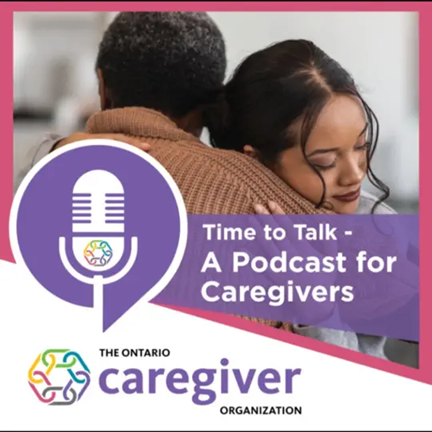
Time to talk, The Ontario Caregiver Organization (2022)
Listen to S2, Episode 10: Becoming a sibling caregiver with Helen Ries and Laura Nicholls
“This Podcast takes time for two sibling caregivers to reflect on their experiences about providing care to their siblings, and some of the challenges they have faced. Helen shares how her world changed following the unexpected deaths of both her parents within a few years of each other, leaving her to become the primary carer for her younger brother.
Helen shares her thoughts and feelings about how the dynamics with her brother changed as she navigated decisions she now had to make, and the power struggle with her brother. Helen also talks about assumptions, and that “just because you grow up around disability, doesn’t mean you understand disability”, recognising that even professionals simply expected her to know what to do, and to pick up the caring role from her parents as though this was normal, but it was both scary and hugely challenging.
In the Podcast Laura also talks about her need to find where she fits into the caring role for her younger brother too, and although they both know how important it is to find a balance to live your own life, how difficult this can be. One key message was the importance of having open and honest conversations with your parents and to plan the future care of their son or daughter, challenging the assumptions about birthright to care and the trauma of re-entry into caring, at a time of grief and loss. Siblings Canada (previously called The Sibling Collaborative) mentioned in this Podcast is a similar resource to Siblife, in that it provides the opportunity to connect with other siblings who can understand and relate to similar experiences, to provide support and advice. Listening to others talk in Canada about their sibling experiences which carry many similarities is reassuring and validates that we are not alone.”
Review by adult sibling Becci
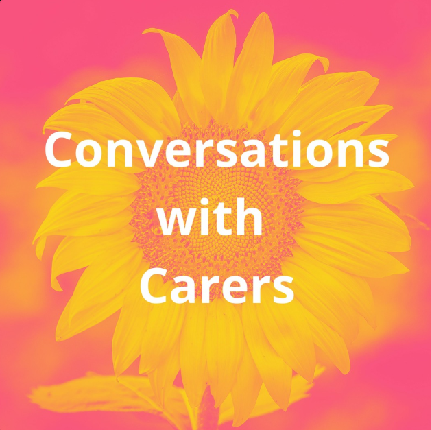
Conversations with Carers, Step Change Studios (2021)
Listen to Episode 3: The informal Carer (with Max Cookward)
“Max grew up with two disabled brothers and has been an informal carer since the age of ten.
In this episode, Max talks about supporting his younger brother as a child, while also providing emotional support to his mothers. He recognises his future role as his brother’s main carer and reflects on how this impacts his own life choices. Siblings play a huge role in the lives their disabled brothers and sisters, however this can impact their own quality of life. For Max this has meant having to grow up fast – something he is now coming to terms with.”
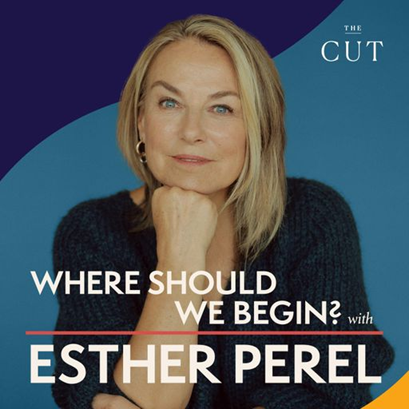
Where should we begin? With Esther Perel (2019)
Listen to S3 Episode 5: Mom and Monique
“This podcast episode is an invitation to listen in to a therapy session between Monique, her mother, and their therapist, Esther Perel. Monique has a brother with special needs and the session is an opportunity to explore Monique’s feelings around this, particularly in relation to Monique’s single mother who has raised them both.
I found this simultaneously helpful and painful to listen to! It was packed full of Monique’s experience which I could relate to on several levels and sometimes Monique gave a voice to feelings that deeply resonated with me. Esther’s insight both in the room with Monique and as an aside to the listener were helpful to reflect on how this might be my experience too. It was interesting to hear a parent’s perspective, particularly as this is something I will probably never hear otherwise.
Other siblings could listen to this for a deep-dive into a sibling’s experience, which may help to understand some of their own or provide insight in another way.”
Review by adult sibling Sarah
